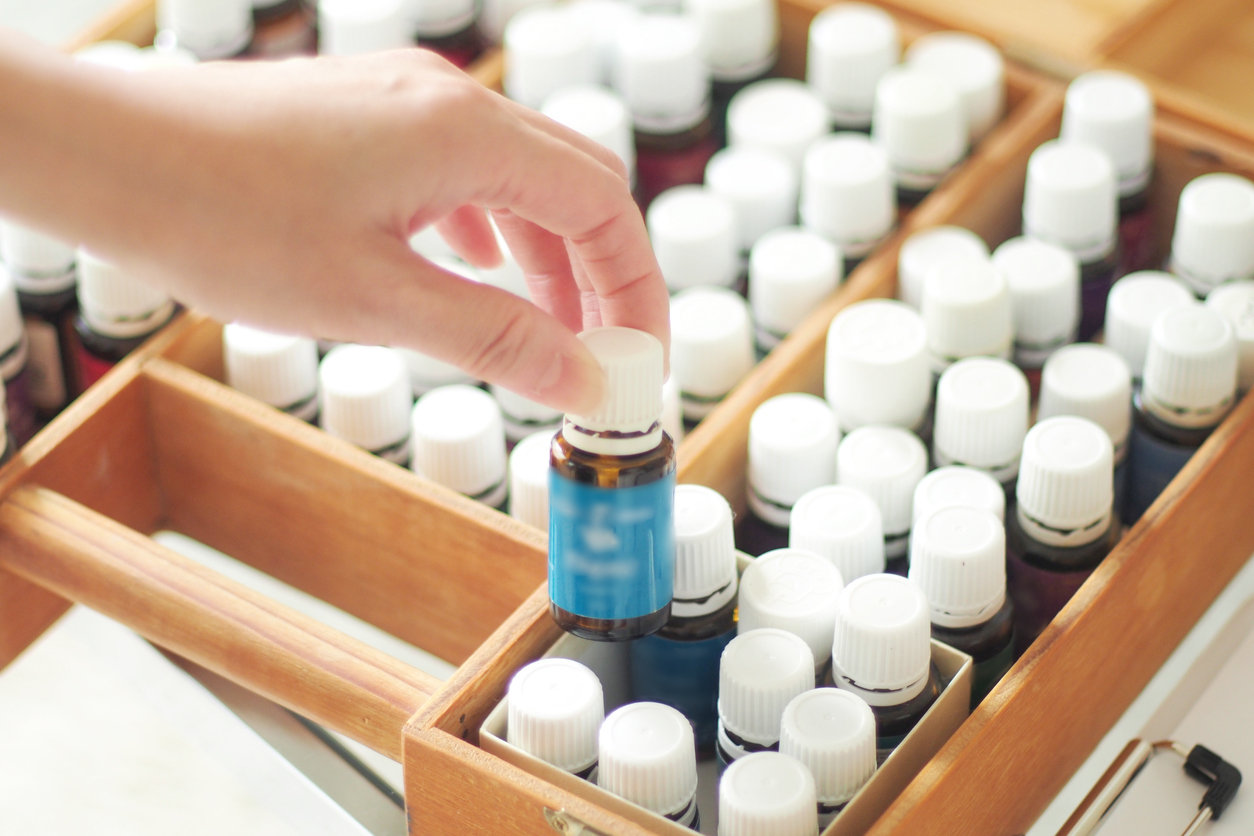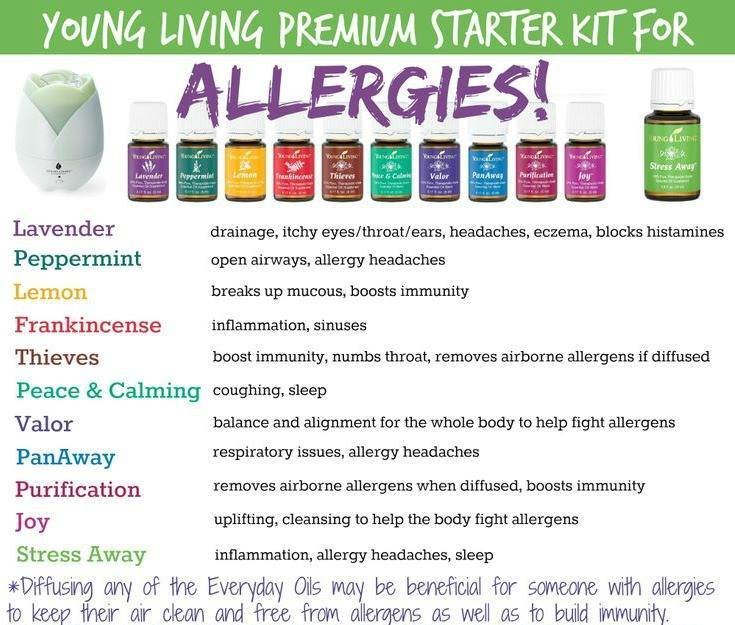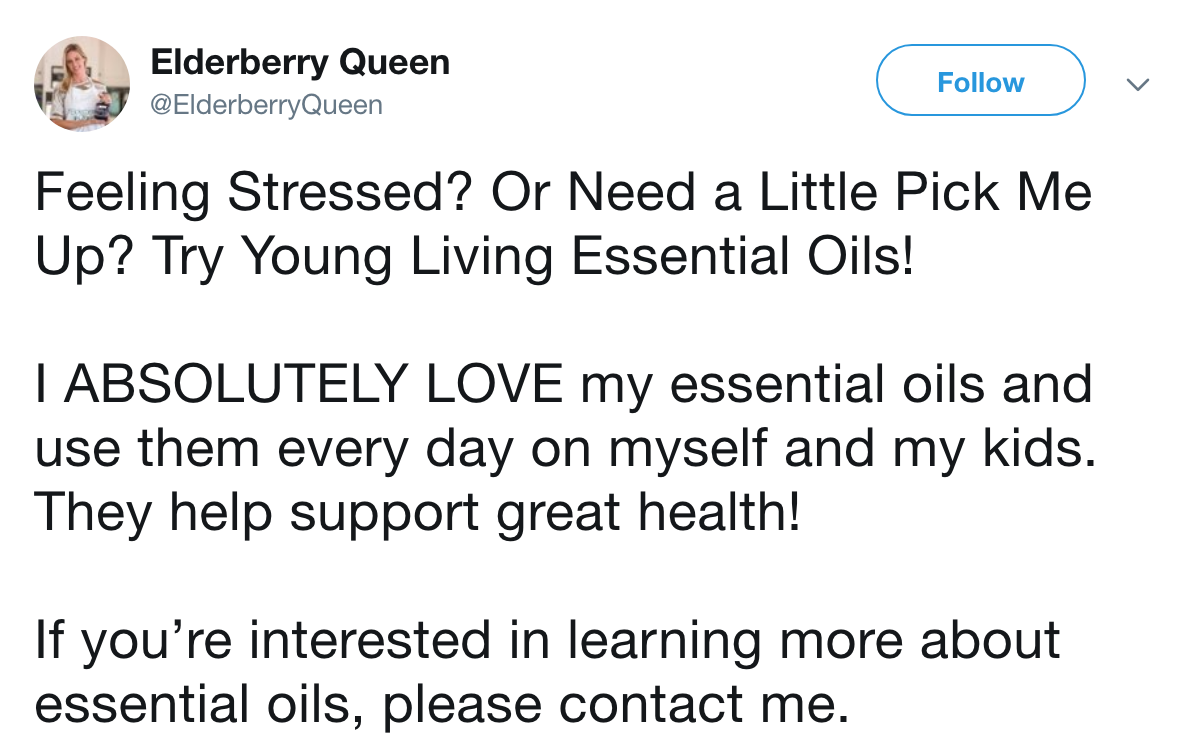
The year is 2018, Donald Trump is the president, and essential oils are being billed online as the cure for everything from colic to mild sniffles. No, that's not the beginning of a dystopian novel — it's just a fact of life for modern parents. No matter what's ailing a kid, there's a good chance parents can look it up on Google or post about it on Facebook and someone somewhere will claim to have an essential oil that can fix it. The only problem is, there's not a lot of evidence to prove that essential oils actually work.
Essential oils are oils extracted from plants and flowers, and they're seen as beneficial by many parents because they're "natural."
In 2016, the global market for essential oils was valued at $6.63 billion. Popular television personalities such as Audrey Roloff post frequently about using essential oils to treat everything from pregnancy stretch marks to insomnia. People also claim essential oil blends can help kids fight congestion, soothe babies to sleep, and even treat seasonal allergies.

Despite the popularity of essential oils and major claims about their "magical" healing properties, the evidence of their effectiveness is lacking.
Wendy Zukerman, a science journalist and the host of the popular podcast Science Vs, recently spent more than two months scrutinizing the science on essential oils and interviewing the academics who research them, and what she found is, well, underwhelming. Although there have been studies that show certain essential oils can have minimal effects on things such as mood or memory, for the most part, Zukerman says, the effectiveness of essential oils has been wildly overstated. In fact, in many cases, it's likely that the results parents claim they're seeing are really coming from the placebo effect.
For her podcast, Zukerman talked to Rachel Herz, a cognitive neuroscientist at Brown University and the author of a book about the power of smell called The Scent of Desire, who said research has shown that how essential oils work is largely based on perception. Herz cited a 2004 study that found that people's reactions to different scents were almost entirely dependent upon what they were told the scent would do for them. For example, when one group of participants was told that lavender is said to be stimulating, their heart rate increased when they were exposed to the smell. But when a different group was told that lavender is said to be calming, their heart rate went down during exposure.
"It’s not crazy that a smell or a chemical in a plant would have an effect on you," Zukerman tells CafeMom.
It's just that the proof that essential oils work is often overstated and can be attributed to either the placebo effect, as in the study mentioned above, or to flaws in experiments, such as the lack of a control group or influencing factors that haven't been accounted for. For example, a 2012 study claimed there is an association between lavender essential oils and reduced symptoms of colic — but the study only looked at the lavender in combination with infant massage, and it only compared the results of the aromatherapy massage to babies who received no intervention at all. So, it's difficult to say whether or not the lavender actually made a difference.
Similarly, a separate study was reported as showing that the scent of lavender is soothing to preterm newborns during heel pricks. But the findings actually showed that scents such as lavender are only soothing to babies if they're recognizable and the baby has been exposed to them before. If the baby was unfamiliar with the scent, it had no effect.
And even in studies where essential oils do have a measurable effect, it's very slight. Zukerman and her team also spoke with Mark Moss, the head of psychology at Northumbria University in the UK, who has conducted studies on whether the scent of rosemary can help improve memory. In one study, Moss and his team had 40 children — some of them in a classroom scented with rosemary and some of them in a classroom with no scent — study a list of words and then recite them from memory. The kids in the rosemary-scented room did actually remember more words; however, when averaged out, the rosemary groups remembered less than one full word more than the other group (4.40 words, compared with 3.37 words from the other group). Those are hardly groundbreaking results.
So, why are essential oils so huge if the science is so sketchy?

One culprit is the way essential oils are marketed and sold. Multilevel marketing companies have sales reps all over the country, often pushing oils on social media and on parenting message boards, and those personal recommendations are easy to trust. "I think the way that they are marketed, where you have friends or so-called friends selling this stuff like you're at a Tupperware party, definitely adds to this like, 'Parents know best' and this anecdotal world," Zukerman tells CafeMom.
But the other factor, says Zukerman, is that essentials really do smell nice and perception is a very powerful thing. "It [the placebo effect] is a real effect, and we all are susceptible to it," she explains. "So if a dad is infusing lavender oil into the house and he finds that his kid is behaving better, is a bit more chill, can go to sleep, like, he’s enjoying that. You don’t need the study, you don’t need to be able to say it’s because the essential oil is getting in the kid's brain. It could just be that the kid really likes that smell or maybe that the kid associates lavender oil with sleeping."
And that's not necessarily a bad thing.
Still, there are some who believe essential oils can pose a risk to kids.
Zukerman advises against taking any essential oil by mouth, and the American Association of Naturopathic Physicians warns that essential oils shouldn't be used in any form with kids younger than 3 months. Others have warned of the possibility of burns from essential oils diffusers, and studies have shown that concentrated and repeated use of essential oils, such as in a spa, can increase the amount of harmful pollutants in the air. Some oils can even pose a risk to pets. Plus, adds Zukerman, "even if essential oils do have something special in them that could say improve memory, we don’t know the dose that you would need in an adult and we don’t know the dose that you would need in children."
There are many unknowns to be aware of when it comes to using essential oils, but that doesn't mean diffusing lavender into the house during a toddler's bath time is an unequivocally bad thing. As always, parents should be aware of the risks and the science, and they should take any questions to their child's doctor.
"I would say if it’s working, keep doing it," says Zukerman, "but just in your mind don’t think it’s because of the magic inside the essential oil."




